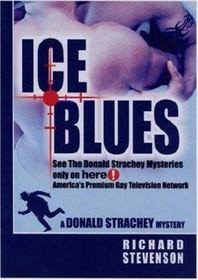Red White and Black and Blue - Stevenson Richard (читать книги бесплатно полностью без регистрации сокращений .txt) 📗
"If it's true," Timmy said, "he should go."
"I know. You've never picked up anything in the assembly about Louderbush? You know the scuttlebutt up there."
I was passing the Bank of America now, and the sidewalk was filling up with people heading out for an early lunch.
Several other pedestrians were also holding their ears in place and talking, and a few were jabbering away, hands-free, at what looked like no one at all.
Timmy said, "Louderbush is thought of as a conservative Democratic straight arrow. His mostly rural district, out beyond Rochester, is heavily Republican. He's a First Gulf War vet who, I think, unseated a GOP old-timer with senility problems who didn't know when to quit. This was fifteen or so years ago. He rose through the assembly ranks as an antitax zealot—the guy seems to be a genuine libertarian—and then when the Tea Partiers came along, Louderbush was all of a sudden more than just another antigovernment kvetch. He's a good speaker, and he has the right personal resume: nurse-wife, three personable teenaged kiddos with Silly Bands on their wrists but probably not on their genitalia, and he teaches Sunday school. When the Republicans looked like they were going with the centrist Ostwind, Kenyon suddenly became the answer to the right wing's prayers."
"Teaches Sunday school. Ah, now we're onto something.
He's a fanatic."
21
Red White and Black and Blue
by Richard Stevenson
"No, he's Presbyterian, like you were."
"That's what I mean. They play Guy Lombardo arrangements of Beethoven. On second thought, that's about as violent as Presbyterians generally get."
"Bad enough."
"When I was thirteen, the teen boys' Sunday school teacher, Lawrence McCool, read us sports stories. Heroes, exciting games, sportsmanlike behavior. Mr. McCool was partial to the Yankees, even though central New Jersey had its share of Phillies fans such as myself. There was a prayer before we left the church each week—that's when Jesus elbowed his way in—but the class was mostly sports. Also the odd off-color joke. It was in Sunday school where I first heard the joke whose punch line is, 'Little man of Spic 'n' Span, where were you when the shit hit the fan?'"
"Donald, now I finally grasp what the Reformation was all about."
I passed the Crowne Plaza Hotel. It was in the bar here where some years earlier, when the place was still a Hilton, I interviewed a man in a case that led to my having one of my ears bitten off. The ear was soon re-attached, and now it was practically everybody else out in public who went around apparently in fear of an ear coming loose.
I said, "This afternoon I'm talking to these two people making the accusation against Louderbush. Meanwhile, I'll be in the office googling up what I can on the suicide. Dunphy says what's there is sketchy."
"If it was a SUNY student, you might get something from the school. Although I suppose their records are confidential."
22
Red White and Black and Blue
by Richard Stevenson
"Yes, I suppose they are."
He heard this the way he often hears things I say, and he briefly moved on to another topic before ringing off.
* * * *
Gregory Stiver's obit appeared in both the Albany
Times
Union
and the Schenectady
Daily Gazette
. Schenectady was where his family lived. The TU also had a brief news story about the suicide.
Stiver, 24, was actually a graduate student in economics—
I had imagined someone a bit younger—who had jumped to his death from the roof of the Livingston Quad 4 classroom tower at the State University of New York's Western Avenue campus in Albany. Police had found no evidence of foul play in the late April incident five years earlier. The TU story said friends had described Stiver as despondent in recent weeks.
The unnamed friends attributed Stiver's despondency to his inability to line up a job that would follow the awarding of his master's degree in less than a month's time. Two possible teaching jobs had recently fallen through. There was no mention of a troubled romantic relationship nor of any physical abuse.
The Schenectady obituary described a life that offered no hint that it might come to a sad and early end. Stiver had been an excellent student in Schenectady public schools. He'd been a member of the debating club in high school and had been on the swim team. He had earned a bachelor's degree in economics at SUNY Albany two years before his death. At SUNY, Stiver had been active in the Federalist Society, the 23
Red White and Black and Blue
by Richard Stevenson
conservative constitutional "originalists"—and also in the Log Cabin Club, the gay Republicans. So he was conservative, he was gay, and he was out.
The photo accompanying the Schenectady obit was a head shot, perhaps a student ID picture, of a pleasant-faced young man with a crew cut and a wide smile. He seemed to be wearing a jacket and tie, an unusual getup for a college student in our casual era.
Stiver was survived, both obits said, by his parents, Anson and Margery Stiver of Schenectady, and by a brother, Hugh, and a sister, Jennifer, also of Schenectady.
A funeral was scheduled to take place at the Fairlawn Presbyterian Church in Schenectady. In lieu of flowers, donations could be made to something called The Eddie Fund, in care of the funeral home.
That's all the Internet had to offer on Gregory Stiver. I googled the Eddie Fund, but nothing came up. Either it was so obscure or so old-fashioned that it had no Internet presence, or sometime during the previous five years the Eddie Fund had ceased to exist. It wasn't in the phone book, either.
* * * *
Virgil Jackman and Janie Insinger had had some sort of falling out, Dunphy had told me. The former friends were no longer speaking to each other, so I was going to have to interview them separately. In fact, I preferred this. I could listen to their own versions of events, cross-check them, and do re-interviews if needed.
24
Red White and Black and Blue
by Richard Stevenson
Already the two accusers had credibility because both had contacted the McCloskey campaign independently with the same story about a physically abusive Kenyon Louderbush having driven Greg Stiver to suicide. Insinger had also called the Merle Ostwind campaign, she told Dunphy, because she was so angry with Louderbush that she was determined that all of his political opponents should gang up on him and keep him from gaining higher office. Insinger told Dunphy that she had not gone to the press with her charges because she wanted her name kept out of the controversy for family and professional reasons. Exposing Louderbush would have to be left up to individuals of a certain ilk such as myself.
I wasn't sure how it would be possible to confirm and expose Louderbush's reprehensible behavior if one of the two witnesses to it refused to be named. I would have to figure that out; maybe other witnesses could be found and they would be willing to speak out. Dunphy said that if I were to become convinced of Louderbush's guilt, he was ready to approach Louderbush privately—no press leakage at this point—and urge him to save himself from public embarrassment over what we had dug up and drop out of the race. Dunphy told me he would consider this an act of patriotism, not extortion. The US Attorney's interpretation of any such conversation might be harsher, however, and I told Dunphy we needed to find a less indictable way to shove Louderbush off the Democratic ticket. He asked me if I had a law degree, and I admitted that, no, I was just another English major. This gave him pause. He said he knew a lawyer he could ask, and he would do that.




